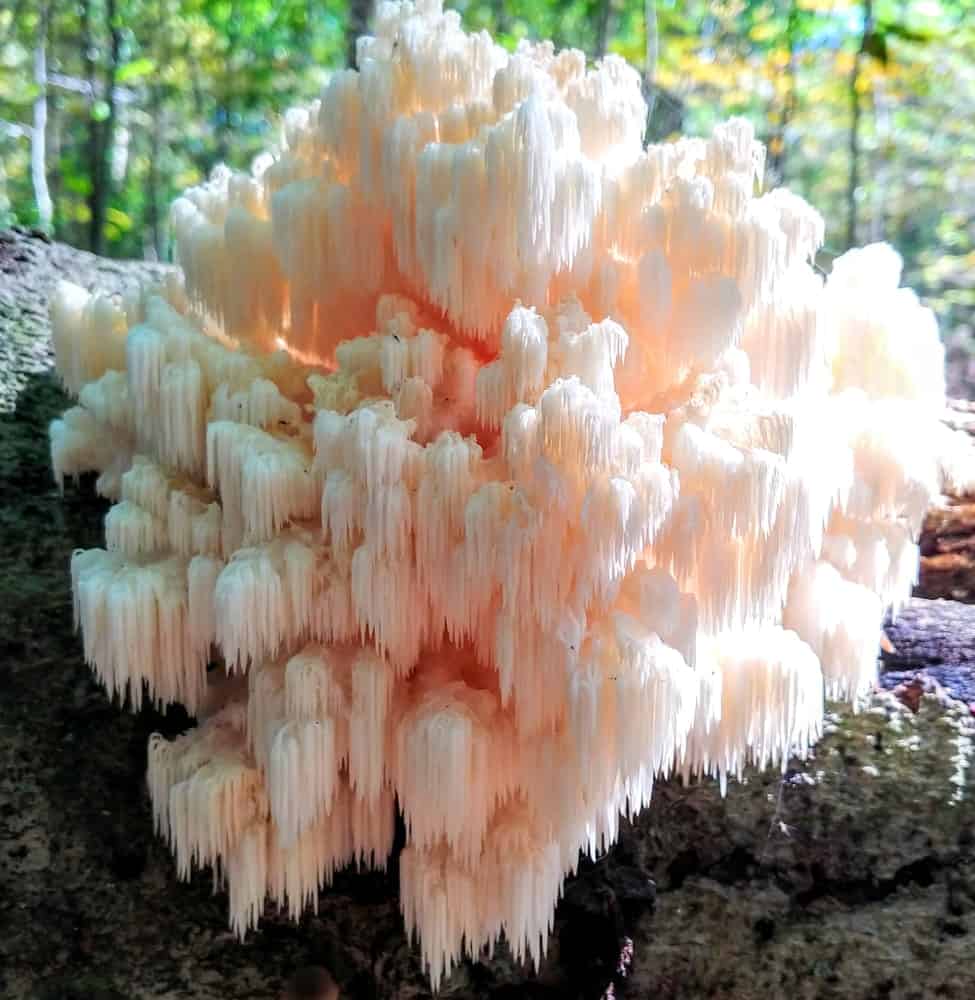Medical Updates: History of Lion’s Mane
Medical: “Lion’s mane, also known officially as Hericium erinaceus, is an edible fungus that has been used in East Asia for centuries as food and medicine,” says Monique Richard, a registered dietitian-nutritionist in Johnson City, Tennessee, and a spokesperson for the Academy of Nutrition and Dietetics.
In Chinese and Japanese medical systems, lion’s mane is traditionally used to fortify the spleen, nourish the gut, and, currently, to treat cancer, per a research paper published March 2017 in the Journal of Restorative Medicine.
Because of its effects on the central nervous system, lion’s mane is also used in traditional Chinese medicine for insomnia and muscle weakness — symptoms of low qi (life energy force), according to the same paper.

1. Improve Brain Function
Lion’s mane mushrooms contain hericenones and erinacines, two compounds that can stimulate the growth of brain cells in lab studies, per past research. In theory, this may have beneficial effects on people with brain conditions.
Past research studied the effects of lion’s mane supplementation on brain function in a group of middle-aged and older adults who had been diagnosed with mild cognitive impairment (MCI). Mayo Clinic describes MCI as the stage between the normal cognitive decline that comes with aging and the more severe decline of dementia. The study found that adults who took four 250 milligram (mg) tablets of lion’s mane three times a day for 16 weeks showed a significant boost in cognitive function compared with those who didn’t. However, these benefits didn’t continue once people stopped supplementation.
A more recent study, published in June 2020 in Frontiers in Aging Neuroscience, found that taking three 350 mg capsules of lion’s mane daily for 49 weeks may have helped lead to significant improvements in brain health in people with mild Alzheimer’s disease.
Still, additional research is needed. https://medicalupdates.in/medical-updates-benefit-of-coffee-with-milk/
2. Support Digestive Health
Properties of lion’s mane have been shown to support the digestive tract. In particular, lion’s mane may help prevent ulcers by stopping the growth of Helicobacter pylori, a bacteria that can have negative effects on gut lining, Richard says.
The authors of a study published in 2019 in the International Journal of Medicinal Mushrooms gave lion’s mane extract to a group of mice with H. pylori. Those that were treated with lion’s mane had lower levels of H. pylori in their stomachs than mice that didn’t receive the extract.
A test-tube study published in the Journal of Ethnopharmacology also revealed that lion’s mane inhibited the growth of H. pylori.
While these results may appear promising, human research is needed to substantiate this benefit.
Lion’s mane may also protect the intestines from inflammation and inflammatory bowel diseases like ulcerative colitis and Crohn’s disease, Richard says.
A study in patients with ulcerative colitis, published in March 2016 in PLoS One, found that those who took a supplement containing 14 percent lion’s mane extract reported improved symptoms and quality of life after three weeks.
That said, in research published in July 2016 in PLoS One, the authors repeated this study with Crohn’s patients, and both the treatment and the placebo group saw similar improvements.

3. Relieve Depression and Anxiety
According to Delk, lion’s mane decreases inflammation, which may help relieve depression and anxiety.
She names one study, published in 2019 in Evidence-Based Complementary and Alternative Medicine, in which overweight and obese patients with mood disorders were given lion’s mane supplements for eight weeks. Not only did these patients experience decreased depression and anxiety symptoms, but they also reported improvements in sleep quality. Blood samples also showed increases in pro-brain-derived neurotrophic factor (proBDNF), a protein that plays an important role in mood and brain health.
In a past study, women with nonspecific health complaints and diseases were given four cookies containing 0.5 grams of powdered lion’s mane daily for four weeks. Those who received lion’s mane cookies reported feeling less irritation and anxiety by the end of the study compared with women who received placebo cookies.
One limitation to this study is that it included only 30 women. Larger studies are needed to show how these findings might help with anxiety, and to see how lion’s mane compares or combines with mainstream therapies for anxiety, like meditation and talk therapy.
4. Boost Immune Health
Research in animals suggests that lion’s mane may strengthen the immune system, helping protect against bacteria, viruses, and other harmful substances.
A past study found that daily lion’s mane supplements extended the lifespan of mice injected with a hefty dose of salmonella bacteria by nearly 4 times more than mice that didn’t receive supplements.
A study published in February 2017 in Food & Function found that lion’s mane mushroom boosted activity in the intestinal immune system in mice. The intestinal immune system works to protect the body from harmful substances that make their way to the gut via the mouth or nose.
As the authors of a study published in June 2017 in Frontiers in Immunology explained, these effects may be partly due to beneficial changes in gut bacteria that activate the immune system.
However, most of the research has been done in animals thus far; human studies will hopefully show how lion’s mane might help the immune system. https://medicalupdates.in/medical-updates-medical-news/
5. Prevent Cancer
Lion’s mane has several unique compounds that may help fight cancer.
According to a study published in August 2020 in the International Journal of Biological Macromolecules, polysaccharide HEFP-2b, a compound in lion’s mane, slowed the growth of colon cancer cells in a test tube.
Another test-tube study, published in May 2020 in Food and Function Journal, demonstrated that peptides found in lion’s mane may help treat lung cancer. Researchers found that these peptides have the ability to capture free radicals (harmful substances linked with cancer) and trigger the death of cancerous lung cells.
But while these findings are promising, the anti-cancer effects of lion’s mane have only been studied in test tubes and animals. Human studies are needed.
6. Manage Diabetes
Lion’s mane may improve blood sugar control and symptoms like nerve pain, making it a potentially helpful tool for diabetes management.
For example, a test-tube study published in November 2020 in the Journal of Ethnopharmacology found that several compounds in lion’s mane prevented alpha-glucosidase activity. In this way, lion’s mane may work similarly to alpha-glucosidase inhibitors (AGIs), a group of antidiabetic medications used to manage type 2 diabetes. AGIs limit the absorption of carbohydrates from the small intestine, helping lower the rise in blood sugar following a meal, according to a July 2022 article in StatPearls.
What’s more, a study in Evidence-Based Complementary and Alternative Medicine revealed that feeding diabetic rats 40 mg of lion’s mane per kilogram of body weight significantly increased their pain threshold after six week of treatment. This suggests that lion’s mane may offer pain relief for diabetic neuropathy, a type of diabetic nerve damage that can cause pain and numbness in the legs and feet.
However, people with diabetes who are taking medication to control their blood sugar levels should approach lion’s mane with caution. Lion’s mane may interact with diabetes treatments, Richard says, causing blood sugar levels to drop too low.
In addition, most of the research in diabetes has been done in animals and test tubes so far — more studies in humans may show if lion’s mane can help with diabetes.
7. Reduce Heart Disease Risk
Research suggests that lion’s mane may lower your risk of heart disease, mainly through its effects on cholesterol.
For example, a test-tube study published in BioMed Research International found that lion’s mane extract may help prevent the oxidation of cholesterol in the bloodstream, which is beneficial for overall heart health.
Meanwhile, previous research evaluated lion’s mane’s cholesterol-lowering effects. Researchers fed lion’s mane to obese rats once a day for two weeks. By the end of the study, these rats showed significantly lower levels of total cholesterol, low-density lipoprotein cholesterol (also known as “bad” cholesterol), and triglycerides (a type of fat found in the blood) than rats that weren’t given lion’s mane.
Despite these findings, Michelle Routhenstein, RDN, a preventive cardiology dietitian and certified diabetes care and education specialist at Entirely Nourished in New York City, doesn’t recommend using lion’s mane to prevent or treat heart disease. “It’s not supported by human studies and the safety and side effects haven’t been studied either,” she explains.
Research on magic Mushroom
Professor Frederic Meunier from the Queensland Brain Institute said the team had identified new active compounds from the mushroom, Hericium erinaceus.
Researchers have discovered lion’s mane mushrooms improve brain cell growth and memory in pre-clinical trials.
“Extracts from these so-called ‘lion’s mane’ mushrooms have been used in traditional medicine in Asian countries for centuries, but we wanted to scientifically determine their potential effect on brain cells,” Professor Meunier said.
“Pre-clinical testing found the lion’s mane mushroom had a significant impact on the growth of brain cells and improving memory.
“Laboratory tests measured the neurotrophic effects of compounds isolated from Hericium erinaceus on cultured brain cells, and surprisingly we found that the active compounds promote neuron projections, extending and connecting to other neurons.
“Using super-resolution microscopy, we found the mushroom extract and its active components largely increase the size of growth cones, which are particularly important for brain cells to sense their environment and establish new connections with other neurons in the brain.”
Co-author, UQ’s Dr Ramon Martinez-Marmol said the discovery had applications that could treat and protect against neurodegenerative cognitive disorders such as Alzheimer’s disease.
“Our idea was to identify bioactive compounds from natural sources that could reach the brain and regulate the growth of neurons, resulting in improved memory formation,” Dr Martinez-Marmol said.
Dr Dae Hee Lee from CNGBio Co, which has supported and collaborated on the research project, said the properties of lion’s mane mushrooms had been used to treat ailments and maintain health in traditional Chinese medicine since antiquity.
“This important research is unravelling the molecular mechanism of lion’s mane mushroom compounds and their effects on brain function, particularly memory,” Dr Lee said.
The study was published in the Journal of Neurochemistry.
UQ acknowledges the collaborative efforts of researchers from the Republic of Korea’s Gachon University and Chungbuk National University.
credit:Science Daily

